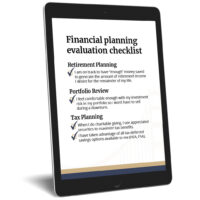
Wealth Management For Business Owners: 7 ways to protect personal wealth
Calling the shots, forging your own path, limitless earning potential—these are the unique joys of being a business owner. But what about the challenges? When you’re laser-focused on business growth (and all the spinning plates that go along with it) personal wealth management may fall to the back burner.
As financial advisors to many successful entrepreneurs, we’ve seen first-hand how important it is to consider how your personal financial plan may affect your business’ continuity—and vice versa. Whether you’re a partner in a law firm, a thriving solopreneur, or an established enterprise, here are seven strategies for protecting your personal finances and preparing for a secure future, as recommend by our registered investment advisors.
Don’t ignore retirement planning
Your business will likely be the biggest source of capital for retirement, whether that’s through ongoing revenue or the eventual sale of your company. But relying solely on your business for retirement puts you at risk for a few reasons.
First, many business owners overestimate how easy it will be to sell the business, how quickly it will happen, and the sale price. Beyond that, if you are self-employed, this means retirement planning falls fully on your shoulders—there’s no employer-sponsored pension or retirement plan to fall back on. Unfortunately, that often means all capital remains in the business, resulting in an extremely concentrated single-asset position. Your proverbial eggs are all in one basket.
To protect your wealth and secure your financial future, we recommend diverting some of your business capital into personal retirement plans. Self-employed or small-business owners have five main options:
- Traditional and/or Roth IRA – You can contribute $6,500 to these individual plans in 2023 ($7,500 for age 50 and older).
- SEP IRA – Simple and cost-effective, a SEP lets you contribute up to 25% of your net earnings from self-employment, up to $66,000 for 2023.
- SIMPLE IRA – Designed for larger businesses of up to 100 employees, a SIMPLE IRA lets you defer up to $15,500 in 2023, plus a $3,500 catch-up contribution if you’re over 50.
- Solo 401(k) – If you have no employees (except a spouse, if applicable) you can make pretax contributions up to $66,000 in 2023, plus a $7,500 catch-up contribution, if eligible.
- Defined Benefit Plan – Also known as a cash balance plan, this plan is great if you have no employees, a high income, and you want to save a lot for retirement on an ongoing basis. The contribution limit varies based on the benefit you’ll receive at retirement, your current age, and expected investment returns.
Each plan type has varying tax advantages and other rules. One of our financial advisors can help you determine which is best for your situation.
Proactively manage income, expenses, and debt
When you own a business, you appreciate just how much your personal financial life is tied to your business. What you may not realize, is how intertwined your own financial wellbeing is with your business partner(s). To protect your personal wealth, you’ll want to set clear rules from the outset for managing income, expenses, and debt.
A Contributions and Distributions Agreement spells out the rules for transfer of assets between personal and business accounts. For example:
- How will you decide about the need for additional infusions of capital, whether from outside investors or from personal accounts? And what liabilities or indemnifications go along with those infusions?
- What are the targets for partners to take profit distributions? Will you and your partners or co-owners receive the same salary?
- How and when will debt be used? The decision to take on debt is a significant one that can affect both personal and business finances. For this reason, all parties should agree on what constitutes a “need” for taking on debt, how much debt the company can sustain, and the types of financing options you’re willing to consider.
Proactively developing clear terms around managing income, expenses, and debt is a form of contingency planning that will help (and protect) you as the business grows.
Shore up your estate plan
You might not think your business’ operating agreement has anything to do with estate planning. But what happens if you or another company owner dies or becomes disabled? No one wants to think about this possibility at the start of a venture. But having the right provisions in place is critical to protecting both the business’ continuity and your personal finances.
Many business exits are voluntary—but in more unfortunate circumstances, a buy-sell agreement will protect your heirs. And if another owner dies, their heirs (and your interest in the company) can also be protected.
Make sure your business’ exit agreement includes contingencies for the death or disability of an owner. Specifically, you’ll want what’s known as an entity-purchase agreement or redemption agreement, which allows the business entity to purchase the deceased’s share of the business. Essentially an insurance policy, the entity-purchase agreement protects you from having to continue with the deceased person’s spouse or adult children as co-owners.
Diversify like a business owner
Diversification of your investments is a time-honored risk protection strategy—it’s basically asset wealth management 101. But most small business owners fail to consider business assets in the context of their overall investment portfolio. As a result, you may be underestimating your own risk exposure.
In other words, what may be an appropriate asset mix for an executive or a W2 employee may not be right for a business owner of the same age and retirement expectations.
Our firm’s holistic approach to wealth management considers all elements of a client’s financial life, and their potential impact on long-term goals. For business owners, this means taking extra considerations to avoid overexposure to risk in your individual portfolio’s asset allocation. Factors we take into account include your:
- Overall amount of business assets
- Business entity type
- Consistency of cash flows
- Exposure to business cycle risks
When your portfolio is constructed with these potential risks in mind, your personal assets are better-positioned to protect you in the event of a business loss.
Invest in liability insurance
Your company may look very different now than it did in the early days. You’ve learned from mistakes, dialed in your systems and processes, and steadily increased business revenue.
As your personal net worth increases, so do your risks and liabilities. Perhaps you’ve bought a home (or two) and purchased a car for your child. You may have even gotten yourself a boat or acquired other luxury goods.
To safeguard your family, your lifestyle, and your assets from the unexpected, you may want to consider adjusting your insurance coverage. We find that our clients benefit most from a safety net consisting of a combination of coverage types:
- Umbrella insurance – Umbrella insurance is a form of personal liability insurance that covers things outside the bounds of your typical home and auto insurance, such as claims of bodily injury, personal injury, property damage, and landlord liability.
- Luxury goods insurance – Homeowners insurance only covers up to a certain dollar amount; for everything above that, there’s luxury goods insurance.
- Income protection insurance – Also known as disability insurance, this protects you from having to use personal savings or sell off assets if you become temporarily or permanently disabled.
- Business income insurance – If your business is forced to shut down for a period of time due to a disaster or other crisis, business income insurance helps you keep making payroll and cover business expenses.
Maintain a liquid emergency fund
Everyone should have an emergency fund—and that goes double for business owners. Even the most successful companies may face unforeseen events that cause a dip in cash flow. We typically recommend a cash reserve large enough to cover at least six months of personal expenses.
This money sits outside of the business for personal use in case of emergency. But instead of keeping actual cash or investing in a certificate of deposit (CD), put the money in a high-yield savings or money market account. This option keeps your emergency fund liquid for immediate access, while allowing it to earn some interest in the meantime.
For business owners, we also recommend a reserve line of credit. This serves as an extra line of defense, in case you ever run up against timing issues with business capital, or an extended period of poor performance in the company.
Pro tip: Apply for your reserve line of credit during high times,
when company cash flow is looking solid.
Develop a disaster plan
Preparing your business for a natural disaster is as critical as preparing your home, yet many business owners have no emergency plan. In the Bay Area, an earthquake could hit at any moment, with no advanced warning. And the “new normal” of California fire season reminds us how devastating nature can be.

Whether it’s a force majeure or a smaller disruption (like a burst pipe or power failure) how prepared are you? At a minimum, you should have:
- A thorough and realistic understanding of potential threats to your business. A review of business interruption insurance can help with this.
- Basic emergency supplies on site, like non-perishable food, bottled water, flashlights, batteries, a portable radio, and a first-aid kit.
- An evacuation plan, including alternative exits and an external meeting point.
- A plan for communicating with employees, customers and suppliers during and after an emergency, including how you’ll access their contact information.
- Physical and digital backups of important records, including building plans, insurance policies, employee contact and identification information. Physical backup should be a fireproof, portable container or a complete backup at a separate location 50 or more miles away.
Whether they work remotely or a disaster occurs at your business’ site, you should also encourage employees to have their own grab-and-go emergency kits.
Navigating overall wealth strategy as an entrepreneur is often more complex than it seems, especially when you have a thriving business. Ultimately, you hope you’ll never have to use your disaster plan, emergency funds, or insurance policies. But having them in place frees you up to focus on continued growth and prosperity. And if the need does arise, both you—and your business—will benefit greatly from having them in place.
Combined with other proactive provisions for retirement investing, estate planning and a diversified portfolio, you’ll be well-positioned to protect your personal wealth, come what may.
Our team has worked with many successful business owners, both as they’ve built their businesses and exited them. We’re independent and owner-operated, which means we’ve been in your shoes. And as a fee-only (fiduciary) financial planning firm, you can trust that your interests come first. Book a meeting with one of our Certified Financial Planners™.
The information provided herein is for informative and educational purposes only. The use of hyperlinks to third party websites is not an endorsement of the third party. Third party content has not been independently verified. To understand how this content may apply to you, please contact a financial advisor.






